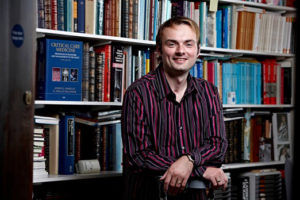Birmingham researchers have shown that specially engineered honey can combat bacterial biofilms found in chronically infected wounds and burns.
NIHR Surgical Reconstruction and Microbiology Research Centre (SRMRC) scientists found that bioengineered Surgihoney can prevent the development of colonies of bacteria which make wounds difficult to treat.
The study found that, in laboratory conditions, Surgihoney prevented biofilm for 16 bacteria tested, both Gram-positive and Gram-negative, including several major antibiotic-resistant strains such as MRSA, Ecoli and Pseudomonas aeruginosa.
SRMRC clinical scientist Fenella Halstead (pictured) led the research, published in Wound Care Journal, at Queen Elizabeth Hospital Birmingham.
She said: “Given the threat posed by antimicrobial resistance, and the ever-increasing need to find new solutions to treat infections, Surgihoney has real potential as a new wound care agent to kill bacteria and disrupt bacterial biofilms.
“Biofilms are found in up to 60 per cent of chronic wounds where there is delayed healing as a result of infection and are protected by a slimy coating which prevents antibiotics from clearing the infection.
“Although further randomised control trials are needed, Surgihoney has considerable therapeutic and infection prevention potential for the management and treatment of chronically colonised and infected wounds, and may help to reduce the use of antibiotics while promoting wound healing.”
Previous studies have found that Surgihoney is highly antimicrobial but this is the first in vitro research to show anti-biofilm activity.
Honey possesses natural antibacterial properties and has been used for wound healing since ancient times but there is a huge variation in the antibacterial potency of different honeys depending on the floral source.
This lack of reproducibility has been a major stumbling block to the use of honey in modern medicine. Surgihoney, however, consists of pure honey that has been biologically modified to produce consistently high levels of antimicrobial activity.
It is sourced from honey farms with stringent controls to ensure it is ultra-pure and free of antibiotics and pesticides and undergoes a specialised production process, including sterilisation by gamma irradiation.
It can be produced from pure honey from a variety of floral sources and in different reproducible strengths.
Co-author Dr Beryl Oppenheim, Consultant Microbiologist at University Hospitals Birmingham NHS Foundation Trust, added: “This study showing the effect of Surgihoney on preventing biofilms in the test tube shows great promise. Our next steps will be to evaluate how it performs in patients who have long-term wounds that are failing to heal.”





